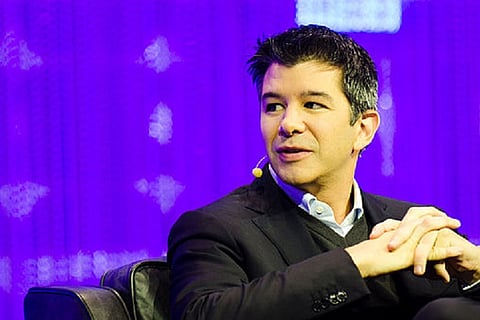

It took him just about a minute to crack the deal, and he wasn’t even pitching one. When Naren Y stood up in front of Uber CEO Travis Kalanick at T-Hub in Hyderabad during “If I were your CEO” session in December last year, he only wanted to ask a question.
Instead, Kalanick offered him a deal, on the spot.
“We connect international students with employers in the US, companies like you,” Naren, the founder of DesiOPT explained to Kalanick at the event, and went on about how many students and clients they have on board.
And then Kalanick asked, “Are we a customer of yours yet?”
“Not yet,” Naren shot back.
“We are signing today. Let’s do this,” Kalanick said, without a thought.
Naren did not really believe Kalanick meant it, and thought it was a joke. But that very evening, the global HR head of Uber emailed him, scheduling an appointment. On January 31, 2017, just over a month after the December event, a 1-year contract between Uber-US and DesiOPT was announced.
“I was in shock,” says Naren, sitting down for a chat with TNM at T Hub in Hyderabad where his startup is incubated, “and it took me two days to come out of the shock.”
So, what is DesiOPT, and what impressed Kalanick so much that he signed a deal on the spot?
The OPT in the company’s name stands for Optional Practical Training, a term very familiar among international students in the US, referring to the one-year period after graduation when students are allowed to work on a student visa.
DesiOPT, which was started by Naren in the US as a hobby, has now turned into a large community for job aspirants helping each other through the complex immigration system. It’s also a bridge between potential employers in the US and international students.
Today, Naren says that DesiOPT has a community of a quarter million students, with 2500 US-based employers and about 100,000 job seekers registered with them – and their primary focus is on STEM (Science, Technology, Engineering, Mathematics) talent.
The registered employers, like Uber, pay a fee to DesiOPT for access to the talent-pool. Students though have free access.
“I think Kalanick signed up immediately because he saw the value in it,” Naren explains. “Getting STEM talent in the US is a real challenge, and we are addressing that problem. We also bring diversity to big companies like Uber,” he says.
The other reason for Uber’s willingness, he suspects, is that DesiOPT is a startup, and Kalanick understands how valuable it can be for a startup when a big corporate steps in. And this is evident from what Shweta Rajpal Kohli, the Public Policy Head of Uber India, had to say about the deal.
"We are happy to be contributing to promoting and supporting innovative ideas out of spirited start-ups in India like DesiOPT,” she said, adding, “Through initiatives like Uber EXCHANGE, our mentorship program for Indian startups, we hope to encourage more people to come up with the next big idea and spur entrepreneurship."
Being offered a deal on the spot however did not mean it was signed immediately. Naren says there were multiple rounds of due diligence by the Uber’s global team, and they had hard questions. Why should Uber sign up, and why hasn’t any other big company signed up yet?
The answer to the first question perhaps lies in T Hub CEO Jay Krishnan’s thoughts on the deal. “Statistically speaking, US has over 1 million international students travelling for higher education from around the globe every year. Last year, from India alone there were around some 2,06,000 students who ventured to the states which itself shows the kind of gifted pool our country actually is,” Jay says.
And it is the access to this pool that Uber could effectively use to their benefit.
As to why no other big company has signed up yet, Naren asks valiantly, “Is not having any other competing company on the same platform not an advantage for Uber?”
Naren, founder of DesiOPT
But it isn’t all business for Naren, an Indian immigrant to the US who had to learn the ropes as an international student himself. He landed in the US in 2000 to study at the Rochester Institute of Technology in New York, and went on to work in Wall Street for nearly 15 years, in firms like Bank of America, Credit Suisse and BNP Paribas.
“Students have a lot of challenges there – it is a new education system, they have no funds and they need help. So, my main goal is to help students. Which is why I started this as a hobby, while I was still at Wall Street,” he says.
But when he realised that more and more people are joining the community online, and there was a profitable business model emerging, he decided to quit and get back to India to work on it full time. He now has about 10 employees in India and the US working on DesiOPT, and they are growing beyond just having Indian STEM students.
The future isn’t without challenges. Trump’s proposed immigration reforms have Indian students and US employers worried. Is Naren worried too? “Well, it depends on what changes he brings. I think we should wait till the actual changes are announced. It could help us too,” he says.
This article has been produced with inputs from T Hub as a part of a partner program.